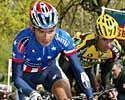
Recently on Cyclingnews.com |
Talking Cycling with Fred Rodriguez
Solo training, Fast Freddy's blend & the last days of Domo
While the cycling world wonders which team he'll be gracing next year, Fred Rodriguez took time out from his team negotiations to talk to Lucy Power about his cycling origins, his emotions regarding the Spring Classics and an up-and-down 2002.
It's been an eventful 12 months for Fred Rodriguez. The 2001 USPRO champion got married late last year to Annie and started off 2002 in spectacular style, narrowly coming second to the future World Champion Mario Cipollini at Milan - San Remo, then chalking up good results at Gent-Wevelgem and the Tour of Flanders - generally making an early-season name for himself. Things fell apart a little as the year progressed as injury and illness diluted his expectations. Nevertheless, Fred is in training at home in California and looking forward to making an impact on the 2003 season.
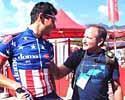 |
Cyclingnews: How did you get into cycling?
Fred Rodriguez: "Pretty much since I was a little kid my dad (who had raced at the highest level in Colombia) was encouraging me, he tried to get me started when I was seven years old but I really hated it - he took me straight up to the mountains! But when I was about eleven I got a new bike and then I was old enough to keep up and not suffer. Back when I was twelve, after the 1984 Olympics, cycling was huge in California. We'd get pelotons of 50 or 60 twelve year olds. I did a lot of racing."
Fred progressed from the Californian mini-peloton through the US junior and senior team ranks and launched his professional career with Saturn. Subsequently he joined two European 'super-teams' in a row - Mapei-Quickstep and Domo-Farm Frites. Along the way he has claimed the USA pro championship jersey twice, as well as featuring in the Tour of Luxembourg, the Tour of Switzerland and a host of other races (check out his record on the right).
2002 marked Fred's first rides in two key World Cup races, the spring classics Paris-Roubaix and the Tour of Flanders. He placed 17th in Flanders and finished Paris-Roubaix in 27th place, riding the last 40km with a broken cleat.
CN: Will you approach Flanders and Paris-Roubaix differently now you know them in more detail?
FR: "Definitely. I was going in there pretty blind, I had driven over the Flanders course, but it's a race that you learn by riding the course time after time. The Belgians just live on these roads and do 20 races a year on them, and that makes a big difference. That one experience of riding the Tour of Flanders will make it easier for me in the future, but in future I'll also spend a lot more time preparing and riding the course beforehand."
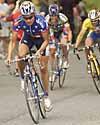 |
CN: You listed your best and worst race experiences as winning the US Pro Champs and Paris-Roubaix respectively - are you eager to go for the US Pro Champ again?
FR: "I am still keen to hold the US jersey next year, but I haven't figured out who I'm riding for yet, and to some extent it will depend on the team, but I'd like to make it my goal to get there, the course suits me. It's a one day classic style, long and pretty hard towards the end, the Americans are pretty keen on winning it so that makes it that much more exciting."
CN: Paris-Roubaix - riders seem to have a love/hate relationship with this race - how do you feel about it?
FR: "I put it in the 'hate' category - because I had such bad luck in it. It was my first time riding it and I was approaching it blind. I don't think it was my bike handling skills that took me off my bike - factors like really bad weather, lots of other riders crashing around me, and lack of experience in this race - being too confident around other people that weren't as confident on their bikes caused me to crash.
"I spent most of my time chasing back on after multiple crashes. I finally had to give up, not because I was tired, but because of a broken cleat - I changed my shoes but by the time I figured out Johan (Museeuw) was attacking, and my team needed to get across to him. It's a chaotic race, and having a mechanical like that can throw you out of the race."
 |
CN: But you still finished.
FR: "I had no other choice, 40km from the finish - although I couldn't pedal properly, I thought I might have to walk on the pave. I was only pedalling with one foot.
"I really hurt myself in Roubaix. I needed a physical therapist to get my body back into shape. And after that I got sick in Philadelphia with bronchitis. The problem was that I didn't realise I was getting sick, so I fought it, then I did get sick, right before Philadelphia. (Fred had to drop out of the US Pro championships mid-race due to breathing problems).
"I went back to Europe and felt I had to make the Tour de France team - so instead of backing off a bit and refocusing, making a second plan, I was adamant that I would do the Tour. I did the Tour of Switzerland, in which I did OK. After that race my doctor said I needed to recoup as much as I could. In the Tour my goal was to get something done in the first 10 days but my body just wasn't there. The mistake I made was that once I got sick in May, I ended up paying for the rest of the year."
CN: Domo/Farm Frites didn't select you for any of the late season World Cup races. What happened?
FR: "There was a lot of dysfunction in the team, with the breakup and worry over who would be doing what. The emphasis of course was on Johan, he's got to be taken care of, and I didn't know if they were going to keep me. I didn't do Paris-Tours because we had too many captains on the team, and at that point I was one of the guys on the bottom of the captain pool."
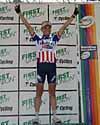 |
CN: What kind of training are you doing at this time of year?
FR: "Slowly building up, trying to create a base for spring, so right now I'm three weeks into training. I'm doing two to three hour rides holding tempo with little bit of work in the mountains. I'm just starting to incorporate some intervals, progressively, throughout the month and increasing next month, and hopefully be rolling by January.
" I enjoy training on my own a lot. Although I have a couple of local friends I train with, I don't usually go out with a big crew."
CN: So you can train by yourself quite happily?
FR: "I prefer it, it's my style of training. Most of our training is so specific, it's hard to match programs with other pros, or other potential training partners who are doing different things."
CN: You've said before that in 2001 you went into the season feeling like you were carrying too much weight from winter weight training.
FR: "I'm still trying to figure out what happened in 2001, the 2000 season ran long, and coming out of that I felt I needed to focus on building more muscle. I knew I would pay for that on the bike, initially, but I felt pressure to perform up to the standards of the other riders early on, and I think I over-extended myself too early."
CN: From what I've read you're not Mr. 50%, you go out there to win?
FR: "I guess mentally if I prepare myself correctly I'm going to go out there and win, and if I'm not prepared I don't give it 100% when I know I'm not 100%. I'm still working on that stuff, as I get older I get more professional, maybe in the future I wouldn't show up to a race if I'm not 100%, in the past being younger I would show up to races and use them for training.
"I think there are a certain number of races you can use for training, but if you do that too much it starts looking bad, although I've always been a guy who gets very good training off racing. For example, Milan - San Remo. The three stage races I did before that were training. I knew my goal was Milan - San Remo."
 |
CN: And it worked exactly to plan!
FR: "The problem is when it doesn't work exactly to plan, then you look really bad, so you have to weigh those odds."
CN: Do you think that judgement comes with experience?
FR: "Yes, for example my decision to ride the Tour de France, looking back, maybe I would have made the same stupid decision - but I shouldn't have done it. I should have refocused and worked on the second half of the season. Life's lessons!"
CN: Do you have any comment on the recent supplements positives?
FR: "We're professional cyclists, we're looking for the edge, going to the stores, looking through the shelves for minerals and vitamins,something that will help us recover faster, and it's scary now. I went to a natural food store, they sell their own vitamins, and a protein powder, just soy protein, but I'm kind of sceptical... So much is going on with these companies, they're mixing some of their supplements designed for other types of athletes. I guess they don't do a thorough job of cleaning out the tanks.
"Domo-Farm Frites was sponsored by Twinlab - we took the whole lot that came in to us and had samples tested to make sure none of them tested positive.
"I don't know how we're going to fix this problem but there is going to have to be further investigation into it. In everything else in life, legally, you're innocent until you're proven guilty - our system (cycling) is backwards."
CN: You mean that in terms of performance-enhancing substances tests it's different to the legal system?
FR: "Well yeah, and it shouldn't be like that, that fact hurts guys like Moninger."
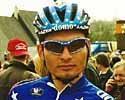 |
Fred hasn't yet signed to a team for 2003, although he told Cyclingnews that he's in negotiations with a couple of teams and hopes to make a decision about the coming season very soon.
CN: What are your goals for 2003?
FR: "The World Cup races. I'd like to improve and have a good World Cup throughout the whole year. I'd also like to go back to the Tour of Flanders and Paris-Roubaix, and show that I do have what it takes - I did show that, but now I need to back it up with some results."
Fred and his wife Annie divide their lives between their homes in California and Girona, Spain, home base of quite a few American professional cyclists. We talked about their lifestyle and some of Fred's hobbies and interests, coffee and technology being two that mark him as Californian!
FR: "My wife (Annie) works for an internet company so she's able to telecommute when we're in Spain, she comes over to Spain about a month and a half after I do. We're usually home in California for a break after the Classics in May. We head back to Spain again together and she'll stay to the end of the season. It works really well. I find it tough even for that month and a half not having her around me, it's a little bit of a change of lifestyle. So far Kayleigh (the dog) has not travelled yet, she's getting prepared to travel next year."
On the coffee front, Fred is the proud creator of a coffee blend dubbed 'Fast Freddie's Turbo Blend.' "At the moment it's only going to be sold in California. In the Bay Area coffee is a huge thing, we've been contacting local shops and testing it with local consumers, and we'll sell it locally for now. We were getting asked through my website about shipping to Europe, but weren't ready to work on that scale yet. The next step would be to sell it off the website. Right now I'm looking for someone to take over my website. At the moment Annie takes care of it, but it's a lot of work."
And then there's technology... "I'm a practical gadget guy - laptops, palm pilot, basic tools that allow me to travel. I don't spend a fortune on gadgets, but I've wired my house for infra-red and make it communicate with my laptop so I can turn lights on and off, just little stupid things like that."
Cyclingnews will let you know who Fred is riding for next year just as soon as we find out!
Further reading:
Odessa Gunn also talked
to Fred in the Odessa Files more
than once in 2001.
The Lotto-Domo superteam story starts
here.
Fred's website

